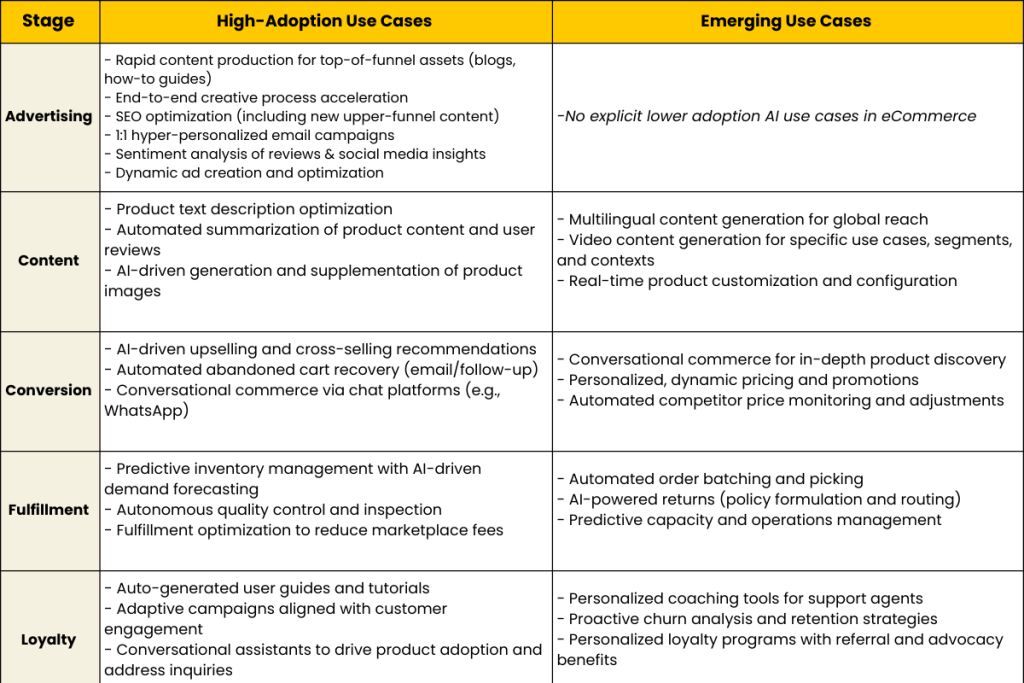
-
Apexlink
Real Estate
-
DLS
General Insurance
-
DMV
Government
-
Entiger
Fintech
-
GIS Mapping
Gas & Petroleum
-
HMS
Employee Benefit
-
HAWA
Government
-
Harley
Community
-
IHG
Hotel & Tourism
-
Sparkseeker
Humane Tech
-
Track Ninja
Sports
-
Response Vision
Disaster Management
- AI/ML Services
- Application Services
- Automation Services
- Cyber Security
- Chatbot Experts
- Data Analysis
- Data Warehouse Services
- Digital Commerce Services
- Digital Transformation
- Infrastructure Service
- Low Code/No Code
- Managed IT Services
- IT Support
- IT Consulting
- IT Outsourcing
- Mobile App Development
- IOS Development
- Android Development
- Cross Platform Development
- Gaming App Development
- Software Development
- System Design & Architecture
- Testing Services
- Web Development
Accelerators
POCs and Products
Generative AI in ecommerce is bringing about several noteworthy shifts in the industry. More than just another fancy tool, this powerful technology is redefining the e-commerce businesses as we know them by helping establish stronger connections with customers, streamlining sales, and ultimately, boosting sales.
Online shopping is such a refreshing experience for modern shoppers and businesses, thanks to the implications of generative AI in eCommerce. Do you know what is the best part? Big corporations and small businesses, everyone can benefit from it!
What is generative AI?
Generative AI is a branch of artificial intelligence solutions that consists of algorithms trained on huge datasets. The algorithms can process the data and existing information to come up with the best response based on the input prompt. The datasets consist of text, visuals, audios, and pretty much every other form. Additionally, these ML algorithms are capable of generating new information that is surprisingly unique.

Different generative AI models have different approaches to generating new content. Some of the most used types of generative AI models in e-commerce are:
Text-based Generative Models
Text-based generative models, such as LLMs, are trained on massive amounts of text data. They are capable of generating human-like content at a lightning-fast speed. From product descriptions and blog posts to FAQ answers, there is nothing you cannot generate using text-based generative models.
In the e-commerce industry, these models can be used to generate keyword-rich and appealing product descriptions at scale, handle customer inquiries, and even create SEO-friendly landing pages and promotional materials effortlessly.
Image/Video Generative AI Models
Image and video generative models like Generative Adversarial Networks (GANs) and Diffusion Models can be trained to create or modify these media forms. These models can produce new visual content from scratch or enhance existing imagery as required.
There are several applications of image/video generative models in the e-commerce domain. These can be used to generate product imagery with different backgrounds, colors, or styles without costly photoshoots. By utilizing these models, e-commerce businesses can also incorporate virtual try-ons for clothing and accessories on their e-commerce business website or mobile app. Creating lifestyle imagery is also among top AI applications in eCommerce using such image and video generative AI models.
Audio Generative Models
There are several text-to-speech and music generation AI models that make it possible to create or manipulate audio content. These models can be trained to produce human-like voices or even create unique soundtracks.
Specifically in the e-commerce industry, these audio generative AI models can be used to enhance voice-based shopping assistants or chatbots for a more convenient shopping experience and create custom branding elements for marketing and promotions.
Multimodal Generative Models
Multimodal models combine the best of text, images, video, and audio for generation if complex and context-aware outputs. For example, a single model could be trained to generate a product description along with a matching image.
Multimodal generative models should be harnessed effectively to ensure you get the best out of it. You can use these models for end-to-end content creation or create interactive shopping guides for your eCommerce business.
Recommendation & Personalization Models
Recommendation and personalization models use generative embedding-based approaches to infer user preferences or fill in missing information. Even though they do not generate content per se, they help e-commerce businesses by suggesting products in a more personalized manner.

Applications of Generative AI in E-Commerce
Now, let’s look at these transformative use-cases of generative AI in e-commerce in detail.

Automated Content Creation
Instead of writing product descriptions for your e-commerce business manually, you could use these generative text models to create descriptions that are appealing and SEO optimized. Similarly, if you are an e-commerce business looking to expand globally, you could use generative AI to come up with localized versions of product descriptions and marketing materials in multiple languages.
Personalized Shopping Experiences
Text-based generative AI models can power chatbot development for solutions that comprehend user queries, recommend products based on browsing history, and even take care of returns or refunds. Generative AI and predictive models can also work together to generate highly personalized product suggestions, unique discount bundles, and targeted promotions that resonate with individual customer preferences.
Enhanced Product Visualization
Image-generating models allow e-commerce business owners to showcase products in different real-life contexts without costly photo shoots. This could be different room styles, clothing with different accessories, or even outdoor gear in diverse terrains. Your customers could even “try on” clothing or see how something fits into their living space through AI-generated imagery.
Marketing Campaigns
If you need a series of promotional images for your campaigns, generative AI can get the task done in no time. It can craft cohesive visuals that align with your brand’s style guides. Large Language Models can also produce product spotlights, blog posts, and social media captions for a consistent brand voice.
Smart Inventory Management
E-commerce businesses can use generative models to create conceptual prototypes of new product lines before they are manufactured to gauge interest and gather feedback. For made-to-order items like custom T-shirts, jewelry, and more, these models can quickly produce mock-up designs.
Improved Customer Support
Creating clear, step-by-step guides to help customers is a breeze using generative text models. An intelligent AI assistant for shopping can take it further by analyzing browsing patterns and past support interactions to generate personalized product tips, usage suggestions, and more.
Fraud Detection and Security
Generative AI enables fraud detection and security for your e-commerce businesses by identifying patterns and anomalies. These powerful AI algorithms can investigate massive datasets to identify fraudulent activities with speed and accuracy.

E-commerce Value Chain Stages and GenAI Use Cases
Key Benefits of Utilizing Generative AI Models in E-Commerce
Several e-commerce giants across the globe, including Amazon, are already using generative AI to fine tune their processes. Some of the main advantages of leveraging GenAI models in e-commerce are:
a ) The efficiency and scalability that comes from producing high-quality marketing content at scale, in no time is of great benefit to any e-commerce business. This doesn’t only reduce manual effort but also increases time-to-market.
b) You can make the shopping experience more engaging and user-friendly for your customers using personalized recommendations and interactive product visualizations.
c) Automated repetitive content creation tasks and reduced dependency on photo shoots saves time and resources both.
d) You can expand your e-commerce business to new markets and establish better connections with diverse audiences by generating localized, multilingual content.
e) Maintaining a consistent voice and style is a breeze using generative AI for eCommerce, resulting in enhanced brand recognition and trust.
f) By delivering more relevant and user-centric experiences, generative AI helps boost conversions, customer satisfaction, and long-term loyalty.

Experience Excellence in AI-Based E-Commerce with Seasia Infotech
The e-commerce development experts at Seasia Infotech are well-versed with the wonders generative AI can bring to eCommerce businesses. From personalized product recommendations to automated content generation and seamless inventory management, we empower your brand to connect with customers more meaningfully.
Previously we have developed state-of-the-art virtual trial rooms for leading eCommerce businesses along with uniform building software solutions. Trust our proven expertise in AI and eCommerce, innovative approach, and commitment to excellence as we elevate your online retail presence—and your bottom line—through intelligent, future-ready technology!
Frequently Asked Questions
What opportunities does generative AI present for digital commerce?
Key opportunities that AI presents for digital commerce solutions include personalized customer experience, automated content creation, dynamic pricing strategies, enhanced virtual assistance, fraud detection and risk management, and predictive analytics.
Is Generative AI secure for handling customer data?
There are certain concerns, such as data privacy, unauthorized access, misinformation and deepfakes, and more that arise when using generative AI for handling customer data. However, these can be mitigated effectively by using adequate data protection measures, continuous monitoring, access control, authentication, and more.
Can Generative AI create product descriptions automatically?
Yes, text-based generative AI models are fully capable of automatically creating product descriptions that align with your requirements and expectations.
What is the cost of implementing Generative AI in eCommerce?
The cost of implementing generative AI in eCommerce can fall anywhere between $20,000 and $50,000 or more depending upon the specific features you are looking forward to incorporating.
What could be the cost of building an AI-Powered ecommerce app?
The cost of building an AI-powered eCommerce app can range from $25,000 to $300,000 or more depending upon the app's complexity.







 Blockchain
Blockchain Cloud Computing
Cloud Computing Infrastructure
Services
Infrastructure
Services Metaverse
Metaverse QA
Automation
QA
Automation UI/UX
UI/UX







